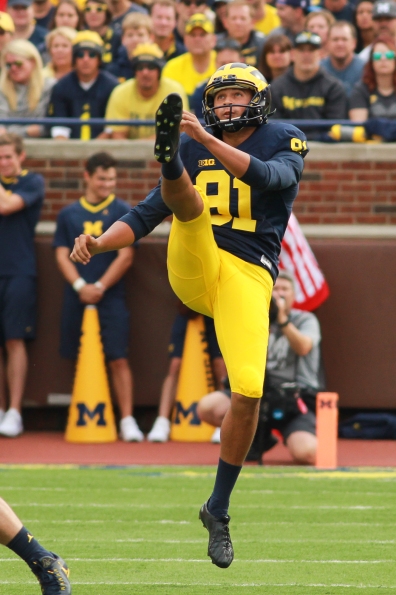Garrett Rivas made a field goal with less than a minute left to cap the biggest comeback in Michigan football history. He went 3-for-3 in a Rose Bowl game. He made all four extra-point attempts and his lone field goal attempt when No. 2 Michigan visited No. 1 Ohio State. And yet, he said, “There’s no more of a pressure situation—not kicking in the Big House or on the road in the Big Ten—than Lloyd Carr standing right behind you with a stopwatch at practice.”
Rivas, who kicked for Michigan from 2003 to 2006, and K.C. Lopata (2004 to 2008) recently spoke to me about their experiences playing for the Wolverines and the program’s current kicking situation. Michigan has made 6-of-11 field goals this season, with all but one of those attempts coming from fifth-year senior Kenny Allen, who also handles punts and kickoffs.
Lopata was U-M’s primary field goal kicker his final two seasons and has run his own kicking and punting clinics for the past five years. He lives in Ann Arbor and has worked with both Allen and sophomore Ryan Tice, the back-up who has handled kickoffs and extra-points in blowout wins. Lopata is impressed with Allen’s ability to juggle all three kicking duties. When I asked him why Allen’s field goal kicking has been inconsistent this season, he said many factors can affect performance.
“I’m only speculating, but the fact he’s handling all three duties—that’s a lot of physical demand to put on one player. Kenny is not just taking those kicks on game day. He’s doing all that stuff throughout the week.” Added Rivas: “Balancing all three in practice—making sure you’re getting quality reps in all three phases without over-kicking—would be a challenge.” Both former kickers think Allen is doing a fine job, but Rivas did note that “the wear and tear on the leg would be a concern.”
Jim Harbaugh has said he’d prefer if someone else could kick field goals or kickoffs, or punt, as effectively as Allen. But until another player proves it in practice, he’ll stick with the fifth-year senior.
Recognizing that weather conditions and the distances of the attempts varied, as well as acknowledging the small sample size, Allen has been much better at kicking field goals when he hasn’t had to punt as much. He only punted three times against Central Florida and made all three of his field goal attempts; he punted twice last week against Illinois and made both kicks. Against Colorado and Wisconsin he punted seven times each and missed four out of five field goals. (Tice also missed one against Wisconsin and U-M did not attempt a field goal in its other three games.) Last year Allen was not the punter and made 18-of-22 kicks.

A struggling kicker is the loneliest player on the team. Michigan had a dedicated special teams coach last year in John Baxter, who’s now at USC. This season, three coaches, who are also in charge of separate position groups, share the special teams responsibilities. Comparing this season to last, Allen said after the first game, “We’re a little more on our own during practice [this year].” That was often the situation at U-M for Lopata.
“As great as special teams coaches are, I think most of them don’t know the mechanics of kicking and punting,” Lopata said. “In terms of making a change or what’s actually going on with kicks and punts, the vast majority of players rely on other kickers on the team, a personal coach, and themselves. One of the biggest things I try to instill in the players I coach is self-correction—being able to give yourself objective feedback regarding your mechanics.”
That is not to say U-M’s coaches aren’t paying attention. A couple of weeks ago, Harbaugh said he’d noticed that Allen was rushing some of his kicks. “You want to be in that 1.25, 1.3 [second] operation time and he was getting down there one time where he was 1.1.”
Lopata watches games very closely and liked what he saw last Saturday from Allen. “He’s doing a lot of great things with his body positioning—keeping his chest up and having a smooth and fluid follow-through. The biggest tell is what’s happening with the ball. Although PATs are short, judging from the ball rotation and how high up on the net it is, I can tell he’s back to striking the ball flush.
“You want to see an end-over-end rotation and the ball rotating at the right speed—not too fast or too slow; just at that nice, correct pace, which you only know if you see it.”
The mental aspect of kicking can’t be overstated, though it’s impossible to quantify and difficult to manage. Lopata said if he was kicking well in practice it carried over to games. Rivas, who is an assistant football coach in Tampa, Florida, said there was no kick he ever attempted that he hadn’t made countless times before in practice, often with manufactured pressure from coaches.
Michigan fans hope Allen’s solid performance against Illinois—albeit on relatively short kicks—coming off the bye week is a sign that he’s rediscovered his groove. The Wisconsin game would have been less stressful if the Wolverines could have converted their kicks, and the Ohio State defense may keep U-M out of the end zone more than past opponents. For a team with a historically great defense and the country’s third-highest scoring offense, fine-tuning the kicking game could have an important impact on the rest of Michigan’s season.
Lopata believes Allen will step up. “Knowing him very well and watching how he’s responded and his body language, I have great confidence he will finish the season strong and make those kicks when his teammates need him.”
Leave a comment